|
|
|
Sort Order |
|
|
|
Items / Page
|
|
|
|
|
|
|
| Srl | Item |
| 1 |
ID:
135072


|
|
|
|
|
| Summary/Abstract |
Purpose—This article explores the politicization of North Korean human rights in US. foreign policy and the emergence of two different networks addressing suffering inside North Korea.
Design/methodology/approach—Drawing on evidence from primary and secondary accounts, interviews with human rights activists, and participant —observation at thirteen North Korean human rights events in Washington, D.(I., 1 trace the evolution of human rights action and discourse from the 19903 to the present
period.
Findir1gs—Short~ and long—term strategic goals interacted with different moral and principled beliefs, thus resulting in two different policy—activist networks working to alleviate the plight of North Koreans. One group stressed continued humanitarian engagement with North Korea. A second network emerged, shifting their focus towards advocacy and awareness, demanding greater political rights and freedoms for North Koreans.
Practical 1mplica1ions—This article helps identify different cleavages and areas for convergence for activists, practitioners, and policymakers when addressing North Korean human rights.
|
|
|
|
|
|
|
|
|
|
|
|
|
|
|
|
| 2 |
ID:
135388


|
|
|
|
|
| Summary/Abstract |
The article presents a legal document detailing the indictment of Chinese human rights activist and dissident Hu Jia. According to the Beijing Public Security Bureau, the defendant have committed the crime of inciting subversion of state power. The document has been submitted to the Beijing Municipal First Intermediate People's Court in accordance with the prvisions of the Criminal Procedure Law.
|
|
|
|
|
|
|
|
|
|
|
|
|
|
|
|
| 3 |
ID:
134756


|
|
|
|
|
| Summary/Abstract |
Malta became a donor country with European Union membership in 2004. Maltese organizations (most prominently—but not solely—those linked to the Catholic Church) had, however, been active in development overseas long before that date. This essay offers the first systematic, empirically grounded account of Maltese governmental and nongovernmental aid, based on official and unofficial statistical information on official development assistance levels and distribution; a database compiled by the authors covering nongovernmental Maltese development organizations; and an analysis of a sample of government- and nongovernment-funded projects. The essay analyzes the empirical material based on the dichotomy of charity-based versus humanrights-based development and examines how these two development paradigms overlap with—and differ from—the Catholic/secular divide within the Maltese aid landscape.
|
|
|
|
|
|
|
|
|
|
|
|
|
|
|
|
| 4 |
ID:
136928


|
|
|
|
|
| Summary/Abstract |
The puzzle that we address in this essay is the extreme unevenness in the way the Russian public protests against authoritarianism and demands political reforms. Between 2000 and 2013 there were numerous local protests demanding specific actions by municipal or regional officials (for example, to prevent local factory bankruptcy, to stop construction, and to expel migrants). There were also protests demanding better public goods and services such as education, healthcare, and transport, to stop welfare reforms, or against the reorganisation of scientific funding. However, when it comes to protests concerning demands for political reforms such as free and fair elections, the protection of human rights, and for institutionalised democracy, most of the activity was limited to Moscow and other very large cities (Robinson 2013). Elsewhere, the scope of pro-democracy action remained much more limited. A 2012 opinion poll by the Levada Centre has shown that only around 20% of Russians (mostly residents of the largest cities) support the idea of in-depth political reforms, leaving the remaining 80% either against democratic reforms or indifferent to the idea. Furthermore, based on demographic covariates, Levada Centre analysts forecast that this 20–80 breakdown on the issue is set to persist for the foreseeable future.1
|
|
|
|
|
|
|
|
|
|
|
|
|
|
|
|
| 5 |
ID:
134616


|
|
|
|
|
| Summary/Abstract |
This article examines China's response to the 2011 Libya crisis and the emergence of a new diplomatic imperative: overseas citizen protection. Over a 12-day period in February and March 2011, China evacuated more than 35,000 Chinese nationals from civil war torn Libya, testing the overseas crisis management capacity of the Chinese government. Because of increasing domestic pressure to protect the growing population of Chinese citizens abroad, Beijing is developing its diplomatic and military capabilities to manage and mitigate crises overseas. The large-scale Libya evacuation served as a wake-up call for Beijing, that conducting business in high risk countries around the world comes at a price; as a consequence, Beijing will be compelled to reassess its global strategic posture and foreign policy principles.
|
|
|
|
|
|
|
|
|
|
|
|
|
|
|
|
| 6 |
ID:
136440
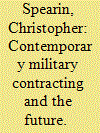

|
|
|
|
|
| Summary/Abstract |
Since the start of the twenty-first century, military contractors such as Blackwater (now named Academi), Kellogg, Brown & Root, and SNC Lavalin have become household names in many countries. The reasons for their prominence vary from case to case. One is notoriety. Particular firms hold contracts valued in the millions if not billions of dollars, and the conduct of some firms has not been beyond reproach in terms of military effectiveness or their observance of human rights. A second reason is reliance. Contractors are needed to keep state military personnel fed and supplied, to maintain their machines, and in some cases even to protect them. Developed world states especially require them for warring, training, and simply operating given the limited numbers of available national military personnel, the increasing sophistication of military technologies, and the political ramifications of applying state forces overseas. In many states, contractors have therefore become part of the total national force. Yet another reason pertains to dedication and sacrifice. Many firms suffered significant levels of casualties during the long-term interventions in Iraq and Afghanistan. Thousands of contracted personnel have provided continuity over the long haul in often austere and intemperate conditions. All of this points to the considerable depth and scope of contractor involvement, arguably unprecedented in recent decades if not centuries. It also stands at odds with traditional conceptions of expensive state security sectors and their capabilities and responsibilities to manage and apply violence.
|
|
|
|
|
|
|
|
|
|
|
|
|
|
|
|
| 7 |
ID:
134546
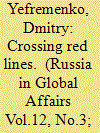

|
|
|
|
|
| Summary/Abstract |
The Ukrainian crisis is just ushering in a series of conflicts amid which a polycentric system of international relations will form. An effective multilateral mechanism must be created for preventing and settling crises in Europe and North Eurasia.
|
|
|
|
|
|
|
|
|
|
|
|
|
|
|
|
| 8 |
ID:
136667
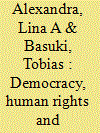

|
|
|
|
|
| Summary/Abstract |
After the transition period, the Yudhoyono administration seems to be more confident to craft incorporate human right factor in to foreign policy consideration. Indonesia, under his leadership, has been very much interested to developed the Indonesia’s soft power diplomacy through the effort to promote democracy and human rights values both regionally and globally. In the beginning of his administration, the ministry of foreign affairs has pursued for promotion and protection of human rights as new principle to be observed by ASEAN member states, and later as one of important pillar in developing ASEAN political security community.
|
|
|
|
|
|
|
|
|
|
|
|
|
|
|
|
| 9 |
ID:
135307


|
|
|
|
|
| Summary/Abstract |
EU migration and asylum policy is facing tough challenges at the southern borders of the Union as migration and asylum pressures rise, fuelled by political instability and poverty in several regions of Asia and Africa. Current European border control practices create three spaces of control: externalised borders, through readmission and return agreements which enrol third countries in border control; the EU borders themselves through the work of Frontex and the development of a whole arsenal of technology tools for controlling mobility to and from the EU; and the Schengen area, whose regulations tend to reinforce deterrence at the borders through the Smart Border System. As a result, the EU’s balancing act between irregular migration control and protection of refugees and human life clearly tips towards the former, even if it pays lip service to the latter. More options for mobility across the Mediterranean and more cooperation for growth are essential ingredients of a sustainable migration management policy on the EU’s southern borders. In addition asylum management could benefit from EU level humanitarian visas issued at countries of origin.
|
|
|
|
|
|
|
|
|
|
|
|
|
|
|
|
| 10 |
ID:
135292
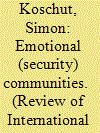

|
|
|
|
|
| Summary/Abstract |
What do Al-Qaeda, Human Rights Watch, and NATO have in common? They can all be understood as emotional communities. Emotional communities are ‘groups in which people adhere to the same norms of emotional expression and value – or devalue – the same or related emotions’. This article develops a conceptual framework for a particular type of emotional community in world politics: a security community. It is argued that emotion norms – the expression of appropriate emotions in a given situation – stabilise a security community during inter-allied conflict. The argument is illustrated by an empirical case study of NATO's military intervention in Libya in 2011. The article shows how the conceptualisation of security communities as emotional communities has significant implications for the study of regional peace and security.
|
|
|
|
|
|
|
|
|
|
|
|
|
|
|
|
| 11 |
ID:
134245


|
|
|
|
|
| Summary/Abstract |
The right to life is inherently connected with the right to food which implies that any foodstuff be nutritious and safe. The government of Bangladesh bears binding obligations to protect these rights under both international human rights instruments and its national constitution. The violation of these rights has, nonetheless, been commonplace causing numerous human deaths and terminal diseases. The perpetrators have been adulterating foods, flouting laws with impunity and taking advantage of regulatory impotence and governmental lenience for decades. Laws exist in books, regulators subsist in theory, but consumers die without remedies. This situation must not prevail forever as every human has an inherent right to live until their natural demise. This article aims to explore the binding obligations of the government to prevent food adulteration and to protect people’s essential rights. It highlights that numerous laws exist almost invisibly in the country, and recommends that their enforcement be reinforced in order to protect the people who are exposed to the overly contaminated food markets in Bangladesh.
|
|
|
|
|
|
|
|
|
|
|
|
|
|
|
|
| 12 |
ID:
137142
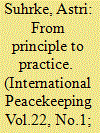

|
|
|
|
|
| Summary/Abstract |
During its engagement in Afghanistan, the US military seriously tried to mitigate the risk of civilian casualties from airstrikes only when called for by changes in military doctrine emphasizing the need to gain the support of the population. Consistent efforts by external political and humanitarian actors to reduce casualties by demanding more transparency and clearer lines of accountability for ‘collateral damage’ had little immediate, observable effect. The case study underlines the contingent nature of progress towards protecting civilians in armed conflict even when a military institution formally accepts the principles of customary international humanitarian law, but concludes that, faute de mieux, strategies to enhance protection through greater accountability and attention to the kind of military ordinance used remain central.
Over time there have been significant advances in international humanitarian law to strengthen the protection of civilians during armed conflict, and, as Adam Roberts notes, ‘in practice something has been achieved’.1 The record of the US military forces in Afghanistan after 2001, however, underlines the element of contingency in this development. During more than a decade of combat engagement in Afghanistan, the US military operated in a context of customary international law that was formally observed, but measures to reduce the impact of military operations on civilians varied significantly in practice. Only in two short periods did the USA or joint ISAF (International Security Assistance Force) command adopt practices to seriously mitigate the risk of civilian casualties. What explains this variation over time, and what does it tell us about the influence of legal norms on the belligerent?
Civilian casualties produced by US airstrikes produced the vast majority of casualties attributed to allied operations in Afghanistan. Authoritative sources reported almost 2,000 were killed and many more injured in the period 2006–13 (see Table 1).2 The US military and ISAF considered the civilian deaths as incidental damage – the unfortunate, accidental effects of war. Yet as Neta Crawford has argued, these effects were systemic in nature.3 They were ‘normal accidents’ in the sense originally developed by Charles Perrow: the predictable outcome of a flawed system design.4
|
|
|
|
|
|
|
|
|
|
|
|
|
|
|
|
| 13 |
ID:
134648


|
|
|
|
|
| Summary/Abstract |
Sustainable development’ – as currently and politically correctly formulated – provides an inappropriate basis on which to frame a future-oriented UN agenda, and risks perpetuating patterns of assistance in which most UN organisations perform poorly and in the shadow of alternative and more able multilateral and bilateral sources. UN operations should take as their point of departure the comprehensive agenda outlined by the two world summits of 2000 and 2005. This agenda recognises the value-based UN as the only universal-membership organisation, which combines the concerns of satisfying human needs while ensuring security, human rights, justice and sound governance. The post-2015 agenda should not look only at development and environment but aspire to what a million global voices canvassed by the UN in ‘the world we want’ campaign are clamouring for.
|
|
|
|
|
|
|
|
|
|
|
|
|
|
|
|
| 14 |
ID:
134492


|
|
|
|
|
| Summary/Abstract |
Global measurements have become foundational for understanding gender equality as well as for directing resources and policy development to address gendered inequalities. We argue in this article that attempts to quantify gender (in)equality globally have limited potential for successfully challenging gender hierarchies if compared to internationally agreed upon women's rights standards. To make this argument, we start by contrasting the general assumptions underlying the measurement approach with feminist scholarship on gender equality. Second, we examine nine key measures of global gender equality—the majority of which are produced by influential international organizations—and show that their focus on “countability” perpetuates a narrow and misleading understanding of gender (in)equality. Third, we present the CEDAW Convention and associated review process as an alternative to the measurement approach. The comparison highlights the need for evaluative tools that attend to the complexity and fluidity of gender norms and focus on context-specific agency to confront gender hierarchies.
|
|
|
|
|
|
|
|
|
|
|
|
|
|
|
|
| 15 |
ID:
136524


|
|
|
|
|
| Summary/Abstract |
There is a dire urgency to incorporate fair gender policies and developmental programmes while overthrowing age old existing customs and traditions for the world to attain a sustainable development. Thus, gender sensitization in resource ownership and management needs a critical assessment and advancement by way of reshaping or redefining cultural norms, societal expression, and patriarchal idea of marginalization, etc. to achieve greater, if not complete sustainable development.
|
|
|
|
|
|
|
|
|
|
|
|
|
|
|
|
| 16 |
ID:
134645


|
|
|
|
|
| Summary/Abstract |
This article examines the adoption of the rights-based approach (rba) to development at ActionAid International, focusing in particular on its Education Theme. Although there has been a considerable volume of work that examines the rise of rba, including in the pages of Third World Quarterly, the power dynamics and conflict involved in shifting to rba have largely gone unnoticed and explored. Using the methodological tools of discourse analysis and social movement theory on strategic issue framing, I examine how ActionAid leadership worked to ‘sell’ rba to somewhat resistant staff and partners. I argue that ActionAid struggled to reconcile its commitment to global rights norms with the ongoing needs-based programming at country level. This raises important questions about the power dynamics involved when an ngo undergoes a process of organisational change, even when, as is the case with rba, this is widely seen as a progressive and desirable transition.
|
|
|
|
|
|
|
|
|
|
|
|
|
|
|
|
| 17 |
ID:
137152


|
|
|
|
|
| Summary/Abstract |
Within the debate on climate change and human rights, the field of culture, or cultural heritage in particular, plays a marginal role. At first glance, this seems reasonable, given the range of more concrete challenges people face in the context of climate change. However, the protection of cultural heritage is an important goal in its own right, even against the backdrop of other seemingly more pressing tasks. A human-rights-based approach to the debate on cultural heritage and climate change, it is argued, reinforces the international community's obligations to take necessary mitigation activities. Cultural rights and the corresponding duties, especially those under Article 15(1)(a) of the International Covenant on Economic, Social and Cultural Rights, have the potential to provide an effective additional normative basis for the protection of cultural heritage from the adverse consequences of climate change.
|
|
|
|
|
|
|
|
|
|
|
|
|
|
|
|
| 18 |
ID:
136450


|
|
|
|
|
| Summary/Abstract |
This article explores historical and present-day exclusionary impulses within the human rights movement. It juxtaposes the widely celebrated expansion of universal human rights in the second half of the twentieth century with ideological and institutional counter-movements that have sought to restrict the scope of human rights. Using the exclusionary experience suffered by LGBT people as sexual minorities, the paper argues that we must pay attention to the exclusionary impulses that continually threaten to undermine the full realization of the Universal Declaration of Human Rights’ vision of human rights protection for all, and not just for some.
|
|
|
|
|
|
|
|
|
|
|
|
|
|
|
|
| 19 |
ID:
134602
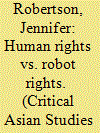

|
|
|
|
|
| Summary/Abstract |
Japan continues to be in the vanguard of human–robot communication and, since 2007, the state has actively promoted the virtues of a robot-dependent society and lifestyle. Nationwide surveys suggest that Japanese citizens are more comfortable sharing living and working environments with robots than with foreign caretakers and migrant workers. As their population continues to shrink and age faster than in other postindustrial nation-states, Japanese are banking on the robotics industry to reinvigorate the economy and to preserve the country's alleged ethnic homogeneity. These initiatives are paralleled by a growing support among some roboticists and politicians to confer citizenship on robots. The Japanese state has a problematic record on human rights, especially toward ethnic minorities and non-Japanese residents who have lived and worked in Japan for many generations. The possibility of robots acquiring civil status ahead of flesh-and-blood humans raises profound questions about the nature of citizenship and human rights. Already the idea of robots having evolved beyond consideration as “property” and acquiring legal status as sentient beings with “rights” is shaping developments in artificial intelligence and robotics outside of Japan, including in the United States. What does the pursuit in Japan of interdependence between humans and robots forecast about new approaches to and configurations of civil society and attendant rights there and in other technologically advanced postindustrial societies?
|
|
|
|
|
|
|
|
|
|
|
|
|
|
|
|
| 20 |
ID:
136468


|
|
|
|
|
| Summary/Abstract |
This article critically explores the implications of the recent turn to transnational efforts in activism that seeks to counter caste-based discrimination. In particular, it analyses the consequences of mobilising a concept of caste that is sufficiently expansive to accommodate occupation- and descent-based discrimination globally, and which primarily frames caste in terms of human rights. To what extent is it possible to maintain a nuanced conceptualising of caste and of what it means to occupy the margins of the caste system, if efforts to influence the workings of global governance institutions divest caste of its regional and local distinctiveness? The article demonstrates how, even though Dalit (‘untouchable’) activists have been successful in bringing attention to caste as a global concern, present endeavours, on the one hand, reinforce the marginalised identity that they seek to overcome and, on the other, fail to recognise the diversity and situated-ness of the Dalit experience.
|
|
|
|
|
|
|
|
|
|
|
|
|
|
|
|
|
|
|
|
|